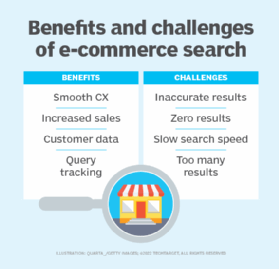
Getty Images
How does e-commerce search work?
Effective e-commerce search relies on detailed product descriptions and metadata. Also, features like autofill and search filters can help organizations offer accurate results.
When potential customers visit an organization's website, the company has already achieved a critical win: The customers believe its products can address their needs. Next, customers need a search function to quickly take them to the products they want.
For effective search, however, e-commerce teams must do more than simply add search engines to their websites. They must understand search tools and methods, such as autofill and query tracking, that can improve conversion rates for sales. These factors can help organizations avoid common pitfalls, such as inaccurate or too many search results.
Why does search matter in e-commerce?
An effective search function is crucial for e-commerce sites because it lets customers find the items they want to buy. Most customers visit e-commerce websites to purchase something. They may look for something specific or try to narrow down their options. Either way, a search function can help them with this process.
E-commerce teams must ensure customers can easily find the search field on the website. Additionally, the search field's character count should be high enough to fit long-tail search queries within it. Customers far along in the decision process tend to use long search queries, because they have a firm idea of what they want.
Products that customers want should appear at the top of the search results. Customers may lose confidence in an organization if they don't see the items they had in mind.
To ensure customers find what they want, e-commerce websites can use autofill features to help customers enter the right search terms. These websites can also use features that let customers pick categories, such as item color and price range, at the beginning of their search and after they see the results. These filters let customers narrow their search results after they see them, so they don't have to enter a new search query.
Finally, e-commerce teams must ensure customers can search from mobile devices. A strong mobile experience lets customers make purchases from any location.
4 benefits of search
An effective e-commerce search strategy can improve CX, boost sales, collect purchase intent data and track market trends.
- Improves CX. Effective search can improve an organization's CX because it lets customers easily find what they want. A smooth search experience encourages customers to buy the products they searched for and makes them want to come back in the future.
- Boosts sales. Customers may come to an e-commerce site with an idea of what they need, but the site may contain other relevant products they may consider. An effective search tool can help customers find these items and lead to a purchase.
- Collects purchase intent data. As visitors enter keywords into the search field, organizations can collect that data and use it to learn more about visitors' interests. More customer data lets e-commerce teams send personalized product recommendations to customers based on their searches, as well as their purchases.
- Tracks market trends. Product names and queries change over time, and e-commerce leaders can track these market trends if they analyze customer queries. For instance, customers may use new slang terms for old products or search for discontinued products. E-commerce teams can use this data to update product descriptions, metadata and discover potential new products to sell.

Effective e-commerce search can offer a smooth shopping experience, increase an organization's sales and enhance personalization efforts. Also, query tracking is the easiest market research to undertake but can significantly improve an e-commerce site. It helps e-commerce leaders understand the terms people use to search for the products they sell.
4 challenges of search
E-commerce teams should understand search's potential pitfalls so they can try to avoid them. These pitfalls, which include inaccurate and slow search results, can lead to poor CX and potentially send customers to a competitor's site.
- Inaccurate results. People expect searches to return accurate results. Therefore, e-commerce teams must implement content marketing strategies to understand the terms and phrases people use to find the products their organizations sell.
- No results. Sometimes e-commerce search engines offer no results, even when the retailer carries the product. To avoid this problem, the website's search functions can use natural language processing or fuzzy search to match customers' searches to its product pages.
- Slow results. E-commerce organizations need to ensure that their search engines always offer speedy results. A retailer's search engine may perform quickly in the summer, but performance may slow during the holiday shopping season. Slow search engines can frustrate customers and send them to shop on competitor sites.
- Too many results. A query that offers many search results may please some customers but overwhelm others. E-commerce teams can create search filters to help customers narrow down search results for more specific searches.
A content strategy can help organizations handle search challenges. Online retailers can improve e-commerce search accuracy if they put proper keywords in product descriptions, titles and meta description tags. They should also capture metadata about every item, such as size or color, to help customers find the exact products they want.







